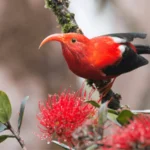
A new curriculum to teach students from kindergarten to high school about Hawaiian honeycreepers is available for teachers to use beginning this month. The curriculum, developed by American Bird Conservancy (ABC) partner group “Birds, Not Mosquitoes” along with Kamehameha Schools and the Kanaeokana schools network, aims to inspire a love of birds and support for Hawaiian honeycreeper conservation.
The material is divided between two presentations: the first on civics, and the second on Hawaiian bird natural history and conservation. The idea was inspired by students and teachers who used their voices to help pass a bill earlier this year designating the ʻŌhiʻa Lehua (Metrosideros polymorpha) as the official Hawaiʻi State Endemic Tree.
“We are looking forward to working with the kumu [teachers] and their haumana [students] to do something similar for honeycreepers,” said Luka Zavas, Outreach Manager for Birds, Not Mosquitoes. Zavas and the rest of the team hope to empower Hawaiian children to use their voices to advocate for a resolution that would declare August 8 Hawaiian Birds Day.
Telling the Story of Hawaiian Honeycreepers
For millions of years, Hawai‘i was a bird paradise free from reptiles, amphibians, and most mammals, but this avian history is little known today. The new honeycreeper curriculum seeks to change that by taking students on a journey through the geological and evolutionary history of Hawai‘i.
Guided by a talking ʻI‘iwi (a crimson-colored Hawaiian honeycreeper species), children learn the story of the islands’ formation and the honeycreepers’ adaptive radiation into at least 59 different species found only in Hawai‘i. The curriculum introduces students to the history of human interaction with these birds as well, from descriptions of native Hawaiian featherwork to readings of firsthand accounts of encounters with now-extinct species.
Students can explore video and audio recordings of birds that still survive today, learning which species inhabit which islands. To supplement the online materials, the curriculum team will give two preliminary presentations and science kits created by Kamehameha Schools to the first 60 classes to join.
Importantly, the curriculum presents a strong conservation message. It explains the urgency and challenges of saving the remaining honeycreeper species — several of which are in danger of going extinct within the next several years. Today, only one-third of Hawaiʻi’s unique forest bird species are still around. The rest have succumbed to threats like invasive species, habitat loss, and disease brought by invasive mosquitoes. Most birds that people encounter in modern Hawai‘i are nonnative species like Cattle Egrets, Mallards, and Northern Cardinals, leaving native birds out of sight and out of mind.
The course materials reconnect the children of Hawai‘i to the honeycreepers whose well-being is an integral part of Hawaiian ecosystems and culture. Zavas and her colleagues hope that this message will inspire the next generation to feel personally connected to honeycreepers and their plight, and raise their voices to champion the lives of the islands’ remaining native species.
“I think I had an excellent education stewarded by equally impressive kumu [teachers] growing up in the public school system in Hawaiʻi, but I canʻt recall being taught about our native honeycreepers,” Zavas said. “I am proud to be a part of this hui [group] that is working to support kumu to bring the Hawaiian honeycreepers into their classrooms.”
###
American Bird Conservancy (ABC) takes bold action to conserve wild birds and their habitats throughout the Americas. Inspired by the wonder of birds, we achieve lasting results for the bird species most in need while also benefiting human communities, biodiversity, and the planet’s fragile climate. Our every action is underpinned by science, strengthened by partnerships, and rooted in the belief that diverse perspectives yield stronger results. Founded as a nonprofit organization in 1994, ABC remains committed to safeguarding birds for generations to come. Join us! Together, we can do more to ensure birds thrive.
Media Contact
Jordan Rutter
Director of Communications
media@abcbirds.org